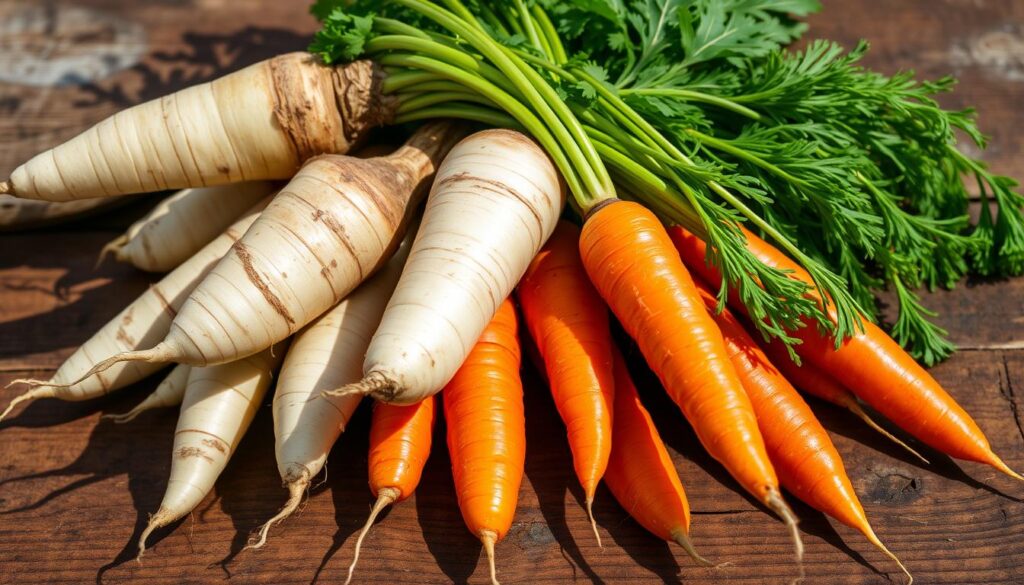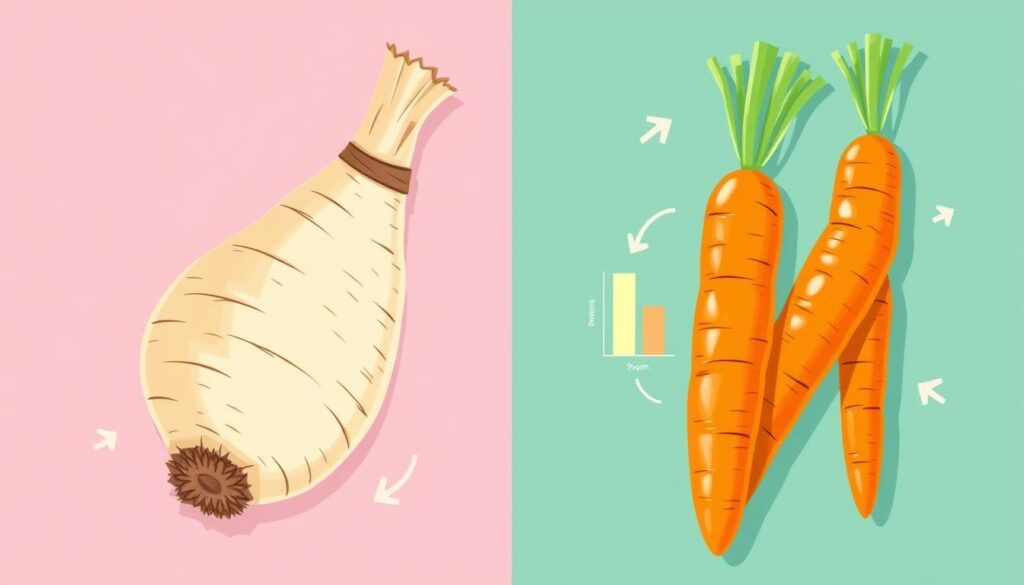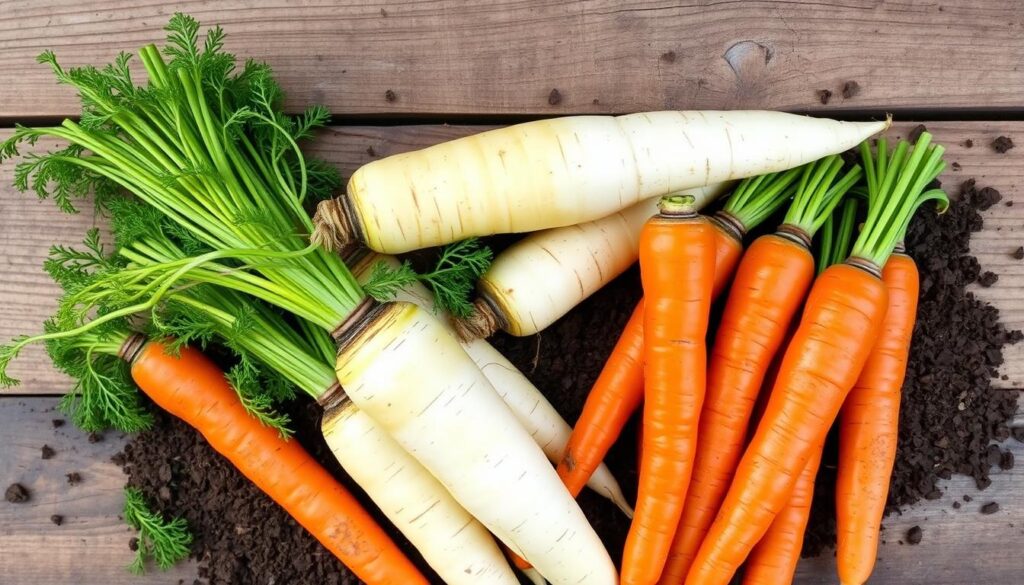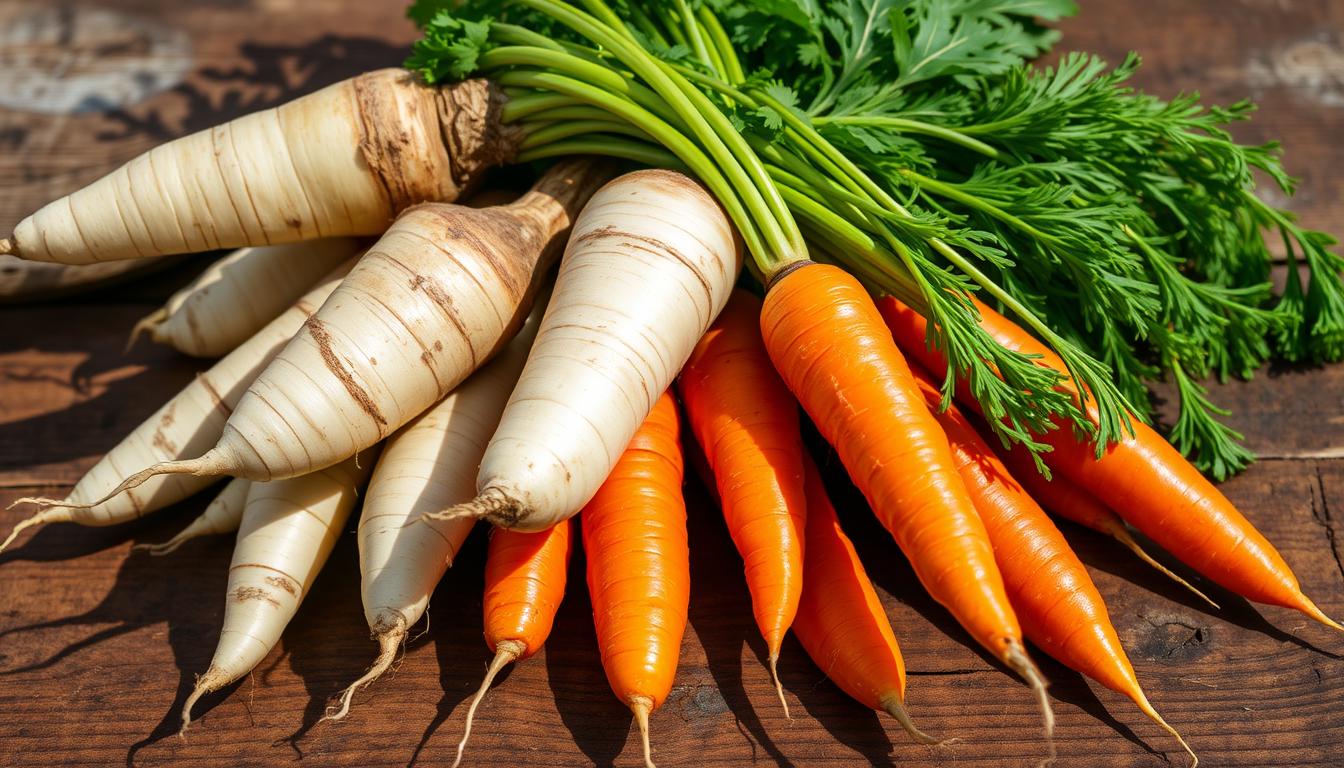Root vegetables are a key part of many diets. They add flavor and nutrition to our meals. Parsnips and carrots are two of the most loved root veggies. Let’s look at what makes them different, from taste to health benefits.

Introduction
Parsnips and carrots are both root vegetables in the Apiaceae family. This family also includes parsley and celery. They look different, taste different, and have different nutrients.
General Differences
Both parsnips and carrots can be cooked in many ways. You can bake, boil, fry, sauté, roast, steam, or grill them. But, they offer different tastes and experiences in the kitchen. Parsnips are richer in minerals and often cheaper than carrots.
Appearance
Carrots are bright orange and juicy. Parsnips are creamy white and slightly spicy-sweet. Carrots are longer and more tapered. Parsnips are broader and more cylindrical.
Taste
Parsnips taste slightly sweet with a hint of spice or nuttiness. Carrots are sweet and earthy. Different cooking methods can improve their taste.
“Parsnips have a unique flavor that sets them apart from carrots, with a slightly spicy-sweet taste that adds depth to many dishes.”
Nutrition Showdown
Parsnips and carrots have different nutritional profiles. Parsnips have more carbs and calories. Carrots, on the other hand, have more water. But, it’s their vitamins and minerals that really stand out.
Macronutrients
Parsnips have about 100 calories per cup. Carrots have about 52 calories per cup. Despite being sweeter, parsnips have less sugar than carrots.
Parsnips also have more fiber, with 6.5 grams per cup. Carrots have 3.6 grams.
Minerals
Parsnips are a mineral powerhouse. They have more iron, potassium, magnesium, copper, zinc, and phosphorus. They score an 8 in mineral comparison, while carrots score a 0.
Vitamins
Carrots win when it comes to vitamin A, with over 16,000 IU per 100g. Parsnips, on the other hand, have no vitamin A. But, parsnips have more vitamins C, E, B1, B5, and K.
Both parsnips and carrots offer unique health benefits. They are both great for a balanced diet.
Glycemic Impact
Parsnips and carrots differ in their glycemic index, which shows how they affect blood sugar. Carrots have a glycemic index of 16, while parsnips have a much higher value of 97. This makes carrots a better choice for those on low-glycemic diets or managing diabetes.
The glycemic index is key because it shows how fast carbs are turned into blood sugar. Foods with lower indexes are healthier because they don’t cause blood sugar spikes. This is good for people with diabetes or those who want stable blood sugar.
| Food | Glycemic Index | Glycemic Load | Serving Size |
|---|---|---|---|
| Parsnips | 52 | 4 | 80 grams |
| Carrots | 35 | 2 | 80 grams |
| Green Peas | 51 | 4 | 80 grams |
| Baked Russet Potato | 111 | 33 | 150 grams |
The table shows the glycemic index and load of parsnips, carrots, green peas, and baked russet potato. It’s clear that carrots have a much lower glycemic impact than parsnips. This makes carrots a better choice for managing blood sugar levels.

Weight Management Benefits
Parsnips and carrots are great for managing weight. They are low in calories but high in fiber. This makes them filling and healthy for any diet. Parsnips have about 75 calories and 18 grams of carbs per 100 grams. Carrots have just 41 calories and 10 grams of carbs per 100 grams.
Both parsnips and carrots are rich in fiber. Parsnips have 4.9 grams of fiber per 100 grams. Carrots have 2.8 grams of fiber per 100 grams. This fiber helps you feel full and keeps blood sugar levels steady, aiding in weight loss.
Calorie Density
Calorie density is key for weight management. Parsnips and carrots are low in calorie density. This means you can eat more without taking in too many calories. It’s great for those trying to lose weight or stay healthy.
Fiber Content
Fiber in parsnips and carrots is another big plus. Fiber slows down nutrient absorption, keeping you full longer. This can help you eat fewer calories and support weight loss. Adding these veggies to your diet boosts fiber and helps with weight management.

“Increasing fiber intake through foods like parsnips can lead to weight loss by reducing appetite and calorie intake, with studies showing that a 14-gram increase in daily fiber could result in a 4-pound weight loss in four months.”
parsnips vs carrots: Health Advantages
Both parsnips and carrots are packed with health benefits. They support heart health, manage diabetes, and lower cancer risk. These veggies are nutritional powerhouses.
Heart Health
Carrots are full of beta-carotene and antioxidants that fight heart disease. Parsnips, with their potassium and folate, help lower blood pressure and stroke risk. Both are rich in fiber, which is good for your heart.
Diabetes Management
Parsnips and carrots help control blood sugar with their fiber. Parsnips have a lower glycemic index than carrots. This means they don’t raise blood sugar as much.
Cancer Prevention
Eating carrots and parsnips may lower cancer risk, like colorectal cancer. Their antioxidants and phytochemicals fight free radicals and support cell health.
Choose parsnips for their sweet taste or carrots for their crunch. Adding them to your meals boosts heart health, diabetes control, and cancer prevention. They’re great for a balanced diet.
Potential Drawbacks
Allergies
Parsnips and carrots are usually safe and healthy. But, some people might have allergies to them. This can cause skin issues, stomach problems, or breathing difficulties.
Some folks might get more sunburned if they eat parsnips. If you have food allergies, talk to a doctor before eating these veggies.
Watch out for any bad reactions. Stop eating them if you get sick. Knowing about food allergies helps you enjoy parsnips and carrots safely.
“It’s key for those with food sensitivities to know the allergic risks of parsnips and carrots. Always check with a healthcare provider before adding them to your diet.”
Conclusion
This detailed look at parsnips and carrots shows their differences and similarities. They both have a similar shape and can be cooked in many ways. But, they have different nutritional values, how they affect blood sugar, and health benefits.
Parsnips are packed with vitamins, minerals, and antioxidants. They have B-group vitamins, vitamin C, vitamin K, manganese, phosphorus, and potassium. They have a lower impact on blood sugar than carrots and help with weight management because of their fiber and antioxidants.
Carrots, on the other hand, are known for their vitamin A. Parsnips don’t have as much of this vitamin. Both offer health benefits like heart health, diabetes management, cancer prevention, and bone health. Knowing these differences helps people choose the right root vegetable for their diet and taste.









